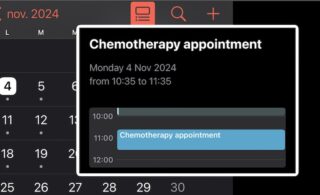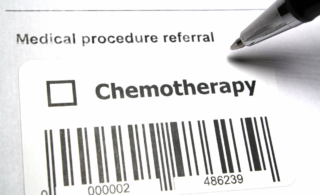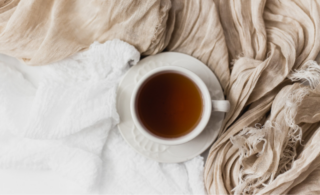
We’ve put together some tips on getting organised at home in advance of starting chemotherapy, from our experience as patients. Your medical team will also be able to give you advice.
Here are 8 important organisation steps to take at home before you begin your chemotherapy treatment:
1. Meal preparation
Consider borrowing or buying a second freezer if your freezer is small or if you don’t already have one. This is so that you can freeze meals which can be used on the days you are not feeling well enough to prepare meals. Friends, family and neighbours may also bring meals over so it is handy to be able to freeze them for when you most need them.
2. Child care and the family command centre
If you have young children, it’s worth planning childcare for the chemo day and for the following five days or so when you might feel poorly from the chemo side-effects (note that some people feel poorly after chemotherapy, whilst other people don’t). You can tweak any arrangements down the line, but if you have plans in place for the first five days then you don’t need to be organising things while potentially feeling poorly post-chemo.
It is also worth considering setting up some sort of area at home where all household, child care and school information is situated so that on the days when you’re feeling poorly, someone else can take charge over these things. Sara’s mum and husband found the following things invaluable for the days when she couldn’t keep on top of things:
- Family calendar (the type with a column for each member of the family and a week on a page).
- Notes of all important telephone numbers including the chemotherapy ward, oncologist, emergency chemo contact, breast care nurse, school, GP etc.
- School run schedule – details of who is taking and collecting children from school and on which days, including phone numbers (she also sent a copy of this to school and put a copy in each child’s school bag).
- Pegs holding school letters, forms, personal admin for each member of the family.
3. Chemotherapy essentials at home
It can make life easier if you prepare what you will need for immediately after chemo on your bedside table. (Some people suggest a “chemo caddy” so you can carry everything with you from the bedroom to the sofa. Or you can duplicate items on bedside table and on the lounge table). These are items that help make any rough days a little bit easier.
- Travel sickness wrist bands to help with any nausea. Some people find Queasy Drops helpful, or mint sweets.
- Nice hand cream as chemo can dry out your skin.
- Tissues because you might lose your nose hair and this means your nose will drip more than usual.
- Indigestion tablets. The chemo nurses can recommend suitable ones for you depending on your chemo regime.
- Notepad and pen to keep a record of your side effects and to note down questions for future appointments as and when you think of them. You might also feel like recording some of your thoughts in a journal.
- Paracetamol. But check if and when you are allowed to take these.
- Throat sweets or throat spray as recommended by your chemo team.
- Soft cap/head scarf and a shawl or blanket to keep warm.
- Thermometer. Invest in a good quality electronic ear thermometer. The chemo team will tell you that if you are feeling unwell and your temperature goes above or below certain points then you will need to call them or your GP. Having a good, accurate thermometer will give your peace of mind when it comes to assessing whether you are at the temperature to call them.
- Lip balm because chemo can dry out your lips.
- Things to do, for example: magazines, books to read, downloaded audiobooks, puzzle books.
- Hard boiled sweets or mints to help your sore mouth.
- Fresh pineapple, frozen fresh pineapple and fruit ice lollies are great for helping ease any discomfort in your mouth. Using a paper straw can also help.
- And importantly, a bell to ring family members for cups of tea/water refills.
4. Your chemo card
You will be given a chemo card from the chemo ward. This says what drugs you are having. Pop it in your purse/bag/phone casse and carry it around with you at all times. It is in case of an emergency – a hospital will immediately know you are on chemo and which drugs.
5. Overnight bag
Pack an overnight bag and leave it somewhere safe at home so that if you are poorly during your chemo treatment and you need to rush off to hospital for an overnight stay, you will already have the bag prepared. Take this bag in the car whenever you go for your hospital appointments and treatment (you can leave it in the car) and so if you have to stay in, your overnight bag is already in the car. Pack things like:
- PJs with easy access for your port/picc line/intravenous cannula
- Phone charger
- Basic toiletries like face wipes, toothbrush and toothpaste
- Antibacterial handwash and wipes for the surfaces in the hospital
- Snacks
- Book/magazines/puzzle book/ something to keep you occupied
6. Organising medication
One of the big changes in your life during treatment will be the need to take lots of medication. You’ll be given all sorts of tablets like pain killers, steroids, anti-sickness, anti-histamine and possibly more! It can be confusing about what and when to take (especially if you’re feeling tired and suffering from brain fog which is a common chemo side-effect) so you need to get yourself a system in place. There are various ways to do this – you can get pill boxes, use a sharpie on the tablet box/foil or maybe try a pill system – there is a good selection online.
In England, make sure you get your free prescription certificate from your GP which entitles you to free prescriptions. Speak to your GP or cancer specialist who usually applies on your behalf, or ask for form FP92A. Take a look at these websites for more information:
7. Preparing for low immunity
Your immunity is low during chemotherapy (because some of your lovely healthy infection-fighting cells are zapped by the chemo) so it is important to take steps to avoid infections and viruses, especially where you have young children in the house (children are basically mobile germ carriers). You might want to consider getting the following (and we’re all quite experienced with this having been through the COVID pandemic):
- Antibacterial hand gel for each room in the house, especially next to the front door so that whenever someone comes in the house they can clean their hands (including you, family members coming home, visitors and post men/delivery people who come into the house or into contact with you at home.)
- Antibacterial hand gel in car and handbag.
- Antibacterial wipes around the house and in the car.
- Antibacterial wipes in handbag for wiping trolley handles, public toilet door handles etc.
It’s a good idea to warn friends, family and everyone who is helping you out that they should avoid you if they are ill. It is a bit embarrassing to send a visitor away because they arrive full of a cold but you need to think of yourself and send them on their way.
And maybe consider getting yourself and your household family members the flu jab if it is coming up to flu season (check with your oncologist first).
If you do get a high temperature you have to call the hospital straight away.
8. Visit the dentist
You might not be able to have dental work done while you are on chemotherapy so it is important to get check your dental health checked out before chemo starts. Additionally, chemo can sometimes cause unpleasant side effects in the mouth (such as a dry mouth and throat, metallic and other odd tastes, ulcers, sore gums and bleeding gums) so it is important to take care of/look after your oral health during chemo.
Further information
For a downloadable and printable version of this checklist, see here.
Future Dreams hold a range of support groups, classes, workshops and events to help you and your carers during your breast cancer diagnosis. These are held both online and in person at the London-based Future Dreams House. To see what’s on offer and to book your place, see here.
To return to the homepage of our Information Hub, click here where you can access more helpful information, practical advice, personal stories and more.
Reviewed February 2023
The information and content provided on this page has been written from a patient’s perspective then reviewed by a breast care nurse and it is intended for information and educational purposes only. It is not intended to substitute for professional medical advice. Please contact your medical team for advice on anything covered in this article and/or in relation to your personal situation. The links and/or recommendations in this article to third-party resources are for your information and we take no responsibility for the content contained in those third-party resources. Any product recommendations made in this article are not product endorsements and unless otherwise stated, they are made without any affiliation to the brand of that product. We ask you to note that there may be other similar products available.
Share

Support awareness research
Donate to those touched by BREAST cancer
Sylvie and Danielle began Future Dreams with just £100 in 2008. They believed nobody should face breast cancer alone. Their legacy lives on in Future Dreams House. We couldn’t continue to fund support services for those touched by breast cancer, raise awareness of breast cancer and promote early diagnosis and advance research into secondary breast cancer without your help. Please consider partnering with us or making a donation.



